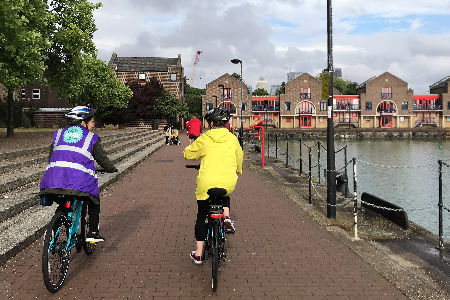
Cycling with hospital staff encourages hospital workers to cycle into work, primarily women who undertake low-paid shift work. Many of these workers are not confident riding bikes and either do not know how or have not ridden for a very long time. This project can help bring the benefits of cycling into their lives, such as free and sustainable transport, and health and wellbeing benefits.
Bikes and equipment should be provided to the participants as they are learning to ride, however they should be encouraged to buy their own bikes, or use Santander bikes, as they become confident enough to cycle to work on their own. Project equipment will stay with the hospital to be ready for a new group of participants. Sessions can be held at the hospital, where bikes and equipment should be stored, so as not to dissuade users who are not ready for the road, and to make it easier for the hospital workers to attend the sessions. As the target group is primarily women, there should be a combination of female only, and mixed sessions.
The legacy of this project comes from the participants becoming cycling ambassadors for their hospital, encouraging more and more people to cycle to work. They can extend this onto their patients as well, to further encourage health and wellbeing through cycling.
Participants should be able to attend as many sessions as they like until they feel confident to ride on roads and encourage others to ride themselves. Sessions should last between 1-2 hours and be held once or twice a week (depending on the number of participants or hospitals) – the best time to do this is in the summer months.
Target audience and engagement
• The key target audiences are low-paid shift workers at hospitals: primarily women, and minority ethnic audiences
• Engagement is done internally through the hospital(s), through advertisements via email and intranet. It is important therefore, to establish a good relationship with them
• Word of mouth promotion once initial participants have been engaged
Reach
• Small to Medium (20-40 participants)
• Geographically - any hospital
Equipment needed
• 10-15 bikes of various sizes
• Helmets of various sizes
• Maintenance kit
• Basic spare bike parts
• Hi-Vis vests
Resources needed
• Project Leader:
-Oversee the project
-Coordinate and attend the sessions
-Ensure all funding criteria and documentation is met (if required)
-Run risk assessment for safeguarding, injuries and to identify any other concerns which may affect project delivery.
-The Project Lead should have the requisite level of CRB and understand health and safety needs (preferably First Aid trained)
• Instructor:
-Run regular cycle confidence sessions
-Teach basic maintenance skills
-Must have the relevant qualifications
• Storage space:
-You will need somewhere to store bikes. The most convenient place would be at the hospital you are delivering. If this is not possible speak to a local community centre, or perhaps another local business that has storage room. Your Council may be able to provide you with information on who to contact.
Estimated project costs
Please note, these costings are based on sessions taking place at one hospital.
• Bikes of different sizes (£200 per bike) £2,000 - £3,000
• Instructor £2,500
• Helmets £1,000
• Maintenance kit and spare parts £150
• Project Leader £1,000
• Hi-Vis vests £200
Top tips/key learnings
• Ensure you leave plenty of time before starting the sessions to find a partner hospital and promote the sessions.
• Try to keep the sessions fun, and unintimidating!
• Always encourage your participants to spread the word and act as ambassadors to fellow hospital workers and to patients.
• It’s good to measure whether participants are more or less confident in cycling, or whether they feel encouraged to ride their bike more. This can be done by a ‘hands up’ survey or with a questionnaire, where participants are asked to confirm or not, certain statements about their view of cycling.
• Depending on the area, you could direct participants to free cycle confidence and maintenance courses – please check with your local council and organisations.
Maximising local contacts
• You might find that a local shop or café is willing to provide water and snacks.
• Talk to local businesses and organisations to see if you can get the bikes donated.
• Engage with your council – they may be able to lend you equipment, help market the project and help secure a space.
This project idea was provided by Access Sport - Twitter - Instagram
If you decide to run your own version of this project in your community, please email us at wcgl@groundwork.org.uk. We love to hear that we are inspiring people to walk and cycle.